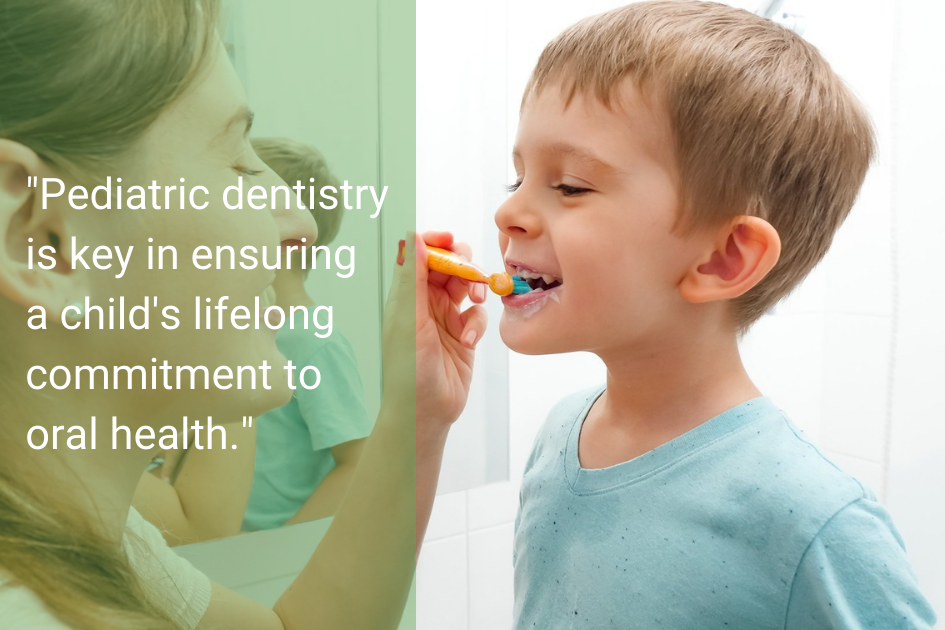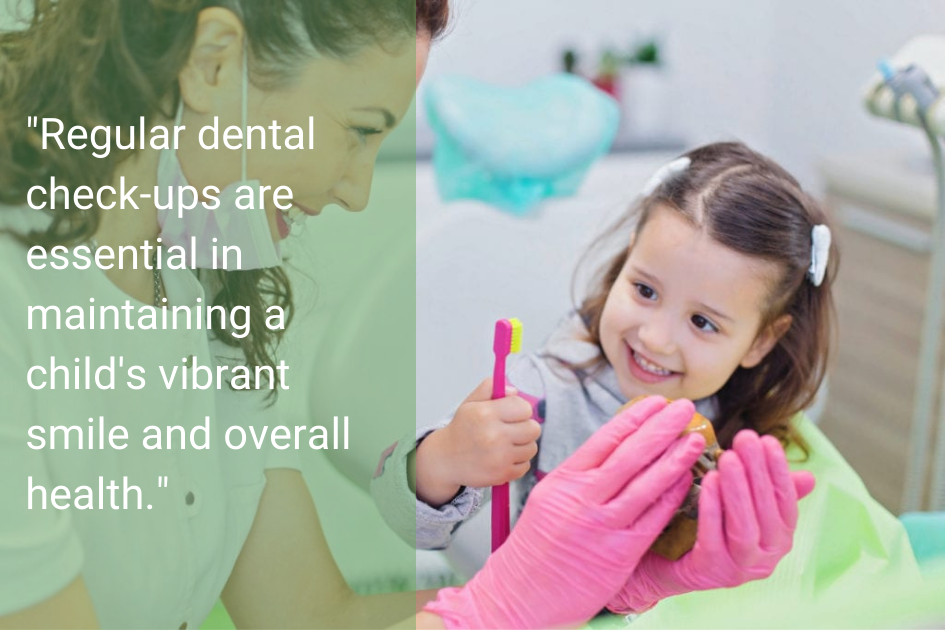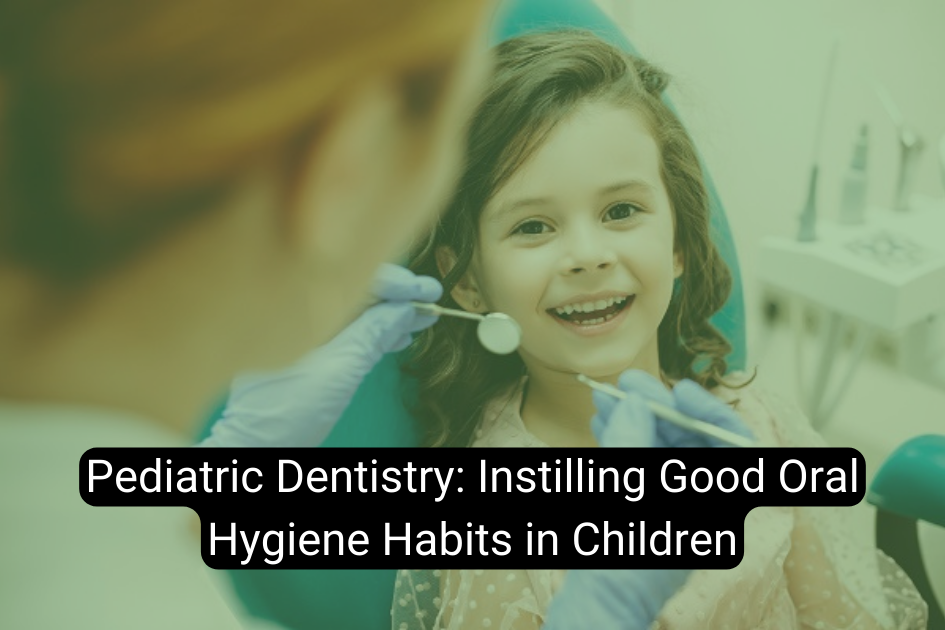Exploring pediatric dentistry represents a crucial step in ensuring your child’s oral health. This process transcends regular dental check-ups; it involves instilling strong oral care practices, preventing tooth decay, and encouraging a commitment to maintaining healthy smiles for life. From the first emergence of baby teeth to the challenges of adolescence, our expert team is committed to providing attentive and thorough care for your child’s dental needs. Welcome to our professional environment, where the dental health of your child is our top priority.
Understanding Children’s Oral Health
Let’s get a handle on your child’s oral health! We’ll discuss the phases of dental growth, prevalent dental problems children commonly encounter, and the potential impact on their teeth over time. Grasping these points is vital in ensuring your child’s smile remains healthy during their growth.
Stages of Dental Development
Understanding the various phases of your child’s dental development is essential for maintaining their oral health. This development isn’t solely about the emergence of teeth but also includes the period prior to the appearance of your child’s initial tooth. Having a solid grasp of these phases will enable you to better safeguard your child’s dental health and ensure a radiant smile.
- Infancy: Prior to the emergence of teeth, keeping your child’s gums clean is vital. A soft cloth that has been moistened can be used to gently clean their gums following meals.
- Toddlerhood: The period when your child’s primary teeth begin to come through. It’s recommended to commence brushing using a small toothbrush with soft bristles and a minimal amount of toothpaste.
- Childhood: The age around 6 is when permanent teeth begin to appear. Regular visits to the dentist are vital during this phase to avoid cavities and other dental issues.
Common Dental Issues
Maintaining the oral health of your child necessitates a good understanding of common dental issues that arise during the development of their teeth. High sugar intake and neglect of dental hygiene are common causes of tooth decay, a prevalent problem that, if ignored, can result in cavities.
Over-retained baby teeth is another issue to be aware of. This occurs when a permanent tooth emerges without the baby tooth having fallen out, leading to potential alignment problems. Bleeding or swollen gums often indicate gum disease, which is a significant worry. Another potential problem is thumb sucking, a habit inherent in some children. This habit could cause incorrect tooth alignment or complications with speech.
Long-Term Impacts
Grasping the enduring consequences on your offspring’s dental health can profoundly mold their overall wellness and self-assurance during their growth. The routines they cultivate and the attention they attain at present will steer their dental health path for their entire life.
Here are the reasons why it’s crucial:
- Prevention of Tooth Decay: Routine dental examinations can detect early indicators of decay, averting agonizing problems in the future.
- Establishing Healthy Habits: Mastering the proper technique of brushing and flossing at present lays the foundation for perpetual good dental cleanliness.
- Boosting Confidence: A radiant, healthy smile can elevate your child’s self-worth and assurance.
Hence, ignoring the significance of children’s dentistry isn’t advised. Providing the appropriate care and fostering the right habits will pave the way for your child to have healthy smiles throughout their life!
The Role of Pediatric Dentistry
While it may seem that all dentistry services are identical, pediatric dentistry holds a special position in maintaining your child’s oral health. Pediatric dentists are experts who are dedicated to the oral health of children from infancy until their teen years. They possess the expertise and understanding to manage the distinct issues that could affect a child’s teeth.
Their concentration is on preventive care to assist every child in cultivating a lasting healthy smile. Pediatric dentists have the training to address children’s behavior, ensuring they’re at ease and their visit is a positive one. They also provide education to children and their parents regarding maintaining oral health and the significance of preventive dental care.
Importance of Regular Check-Ups

Initiating dental consultations from a young age creates the groundwork for enduring oral well-being, yet it’s the consistent examinations that have a critical function in preserving your offspring’s dental health and spotting potential issues promptly.
These appointments extend beyond a brief inspection of your child’s teeth. They offer an opportunity for the pediatric dentist to meticulously cleanse your offspring’s mouth, and assess for cavities, gum ailments, and other complications that might become significant problems in the future.
Consistent examinations also educate your young one about the significance of superior oral cleanliness. Thus, bypassing these meetings isn’t advised. They’re essential in maintaining your child’s vibrant smile, clean breath, and overall health.
Pediatric Dentists’ Expertise
Underestimating the significance of a pediatric dentist in maintaining your child’s oral health would be a mistake. These specialists possess the necessary knowledge and expertise to protect your child’s beautiful smile. They undergo extra training to manage the specific dental issues that children encounter and to ensure their dental visits are a pleasant experience.
Pediatric dentists are proficient in:
- Identifying and addressing dental problems in children, such as cavities and growth-related issues.
- Educating children on maintaining oral hygiene habits, including the right way to brush and floss.
- Implementing preventative measures such as sealants and fluoride treatments to ward off tooth decay.
Teaching Oral Hygiene to Children
When your child’s initial tooth emerges, it’s essential to cultivate sound oral hygiene habits for their enduring dental well-being. You, being the parent, are instrumental in molding these habits.
Here are some habits to instill in your kids:
- Brushing: Educate them on brushing their teeth two times per day, utilizing toothpaste with fluoride. Ensure they clean all tooth surfaces, remembering those at the back.
- Flossing: Initiate flossing when any two teeth are in contact. This aids in eliminating food remnants and plaque between teeth.
- Healthy eating: Motivate them to consume nutritious food, curbing sweet snacks and beverages.
Fun Learning Methods
Integrating enjoyable educational techniques can enhance the process of teaching your children about dental care, making it captivating and potent. Establish a game centered around brushing and flossing, where they can accumulate stars or stickers for their excellent performance. You might even select a catchy, tooth-friendly melody to accompany their brushing routine.
Choosing vibrant, character-inspired toothbrushes and toothpaste can render the process enticing. Reading books targeted at children that focus on dental hygiene can be beneficial. Such books provide a visual and relatable comprehension of the significance of maintaining clean teeth.
Role of Parents and Caregivers
For those in the roles of parents or caregivers, the task of instilling enjoyable dental hygiene habits into the daily lives of children is essential. The task surpasses mere teeth brushing – it’s about fostering lifelong oral health practices.
Here are some strategies:
- Inject enjoyment: Transform the act of tooth brushing into an engaging game or narrative. Toothbrushes that are brightly colored or adorned with beloved cartoon characters can enhance the appeal.
- Show and tell: Demonstrate the proper way of brushing teeth by joining them in the activity. This not only teaches them the correct technique but also promotes a sense of camaraderie.
- Maintain regularity: Formulate a consistent routine where teeth are brushed twice daily, each day.
Preventive Measures and Treatments
You’ll find it beneficial to gain knowledge about precautionary steps and remedies in pediatric dentistry!
Fluoride Treatments and Sealants
Our offered fluoride treatments and sealants play a crucial role in safeguarding your child’s teeth against decay and cavities. These are cornerstones of our pediatric dentistry services.
Fluoride treatments enhance the resilience of tooth enamel against decay. Conversely, sealants act as slim protective layers that cover the chewing surfaces of your child’s back teeth, barring food and bacteria from lodging in the grooves and inducing decay.
Handling Dental Emergencies
Even with your utmost effort to include fluoride treatments and sealants in your child’s dental hygiene routine, unexpected dental emergencies can arise and need immediate and proper action. Keeping a cool head and acting swiftly is crucial for parents.
In case a tooth gets knocked out, it should be rinsed gently without scrubbing and attempted to be repositioned back in its socket. If repositioning it proves difficult, preserving it in milk or a tooth preservation solution is advised.
For a toothache, warm water should be used for rinsing your child’s mouth and dental floss can be used to dislodge any trapped food. Should the discomfort persist, a call to your dentist is recommended.
Nutritional Advice
When it comes to your child’s oral health, it’s crucial to comprehend the role their diet plays. The food and drinks they consume can either enhance the health of their teeth or lead to deterioration.
Consider the following preventive steps and nutritional advice:
- Reduce sugar consumption: Sweets and beverages high in sugar can lead to tooth decay. Inspire your child to consume water and maintain a nutritious diet.
- Encourage consumption of foods rich in calcium: Foods such as milk, cheese, and yogurt are outstanding for making teeth stronger.
- Brush and floss on a regular basis: Ensure your child cleans their teeth at least two times a day and uses dental floss routinely to get rid of food residues.
Bear in mind, a nutritious diet coupled with proper dental hygiene habits can safeguard your child’s teeth and prepare them for a lifetime filled with healthy smiles.
Overcoming Dental Anxiety in Children
Feeling apprehensive about dental visits is quite common among children. However, worry not, since there are methods at our disposal to make them feel at ease. Establishing pleasant experiences from the start can pave the way for a future with excellent dental health.
Understanding Dental Fears
Consider these prevalent causes of dental anxiety in children:
- Unknown dental procedures: Children can be afraid of things they don’t comprehend. Break down the process in a way that’s easy for a child to grasp to alleviate this fear.
- Previous unpleasant experiences: If a child has had a distressing experience previously, they may connect that with upcoming visits.
- Apprehension about pain: A lot of children are concerned that dental procedures will cause pain. Reassure them that we prioritize their comfort and we’ll do our best to reduce any discomfort.
Being understanding and patient can significantly alleviate dental fears.
Strategies for Comfort

If your child is apprehensive about a dental visit, rest assured that effective methods exist to alleviate these fears. Begin by painting a favorable picture of the dentist, portraying them as a helpful friend who maintains their teeth in peak condition. Introduce them to the world of dentistry through children’s literature, getting them acquainted with the sequence of events. Simulate the dental experience at home, turning it into a joyful game.
On the day of the appointment, have them bring a beloved toy to offer solace. Commend them for their courage using positive reinforcement. It’s critical that you maintain a tranquil and comforting demeanor since your child can sense your stress. With time, these methods will lessen their apprehension, making trips to the dentist effortless.
When to Start and What to Expect
Though it might appear premature, a pediatric dentist visit is suggested for your child around their initial birthday or within half a year following the emergence of their inaugural tooth, depending on which event happens earlier. This visit holds significant importance for numerous reasons:
- It establishes a beneficial foundation for your child, contributing to reducing potential dental fears in the future.
- The pediatric dentist can detect any premature indications of dental problems such as tooth decay.
- You’ll gain insights into the correct oral hygiene methods for your child’s evolving teeth.
This appointment isn’t solely about inspecting your little one’s small teeth. It’s also a chance for you to gain knowledge about their dental health and foster positive habits right from the onset.
Preparing Your Child
Post your child’s initial dental examination, you may find yourself pondering the best time and methods to gear them up for routine dental appointments. It’s advocated to begin at the earliest convenience, preferably upon the emergence of their inaugural tooth, typically around the half-year mark.
Here’s what to anticipate and how to get ready:
- Discuss the dentist in a positive manner: Dentists are allies in maintaining the health and strength of our teeth. When addressing upcoming appointments, opt for straightforward, upbeat language.
- Engage in make-believe dentist games at home: This can serve to acquaint your child with the proceedings of a dental check-up.
- Peruse children’s literature on the topic of dentistry: A multitude of age-appropriate books exist that portray dentistry in an intriguing, non-intimidating style.
Conclusion
Pediatric dentistry can be compared to a superhero, safeguarding your child’s smile. We’re here to lead your child towards maintaining great oral health, ensuring they adopt all the essential habits while also making the process fun.
It’s critical to remember, initiating this process from an early age paves the way for a future full of healthy smiles. Hence, let’s collaborate to keep those white teeth bright and robust. Welcome to pediatric dentistry, where we prioritize your child’s smile.


